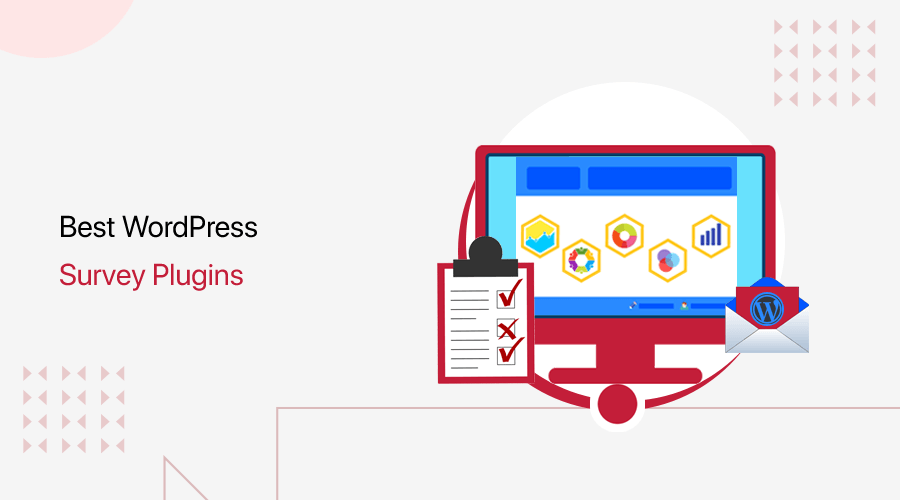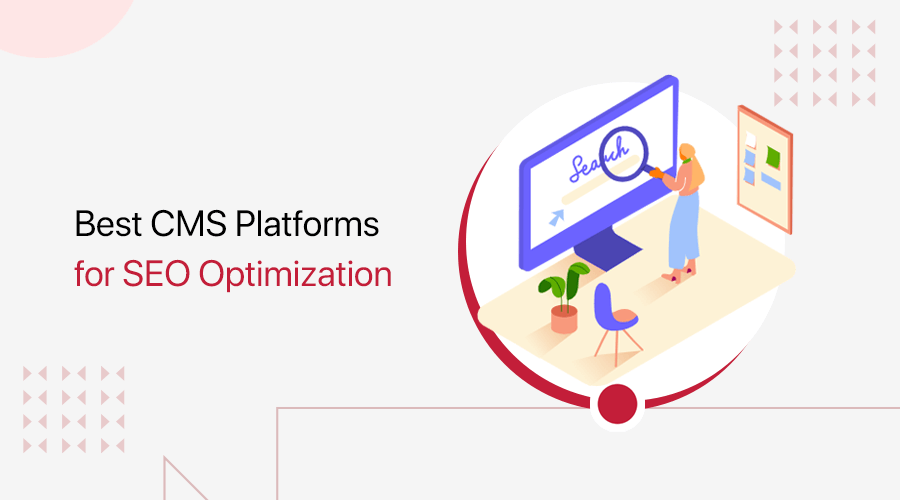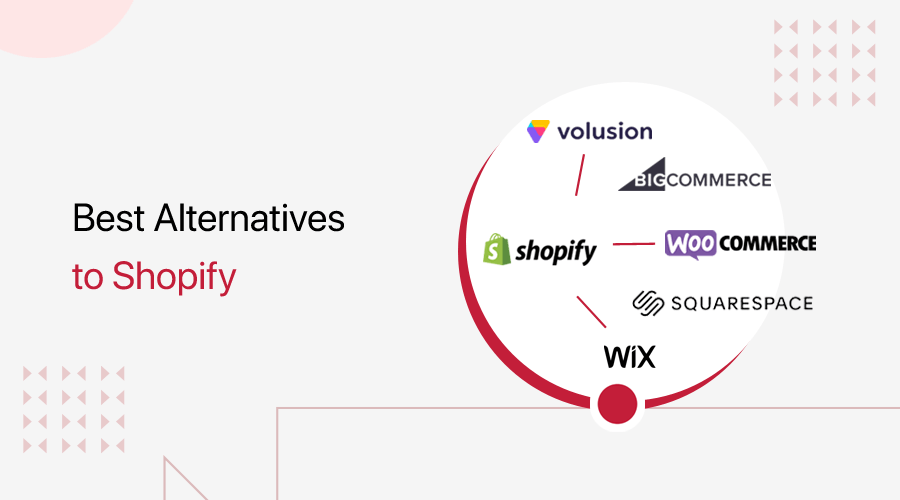
Are you looking for the best Shopify competitors and alternatives? Or wondering if there is any better platform other than Shopify to build your online store? If it’s so, then here we go.
Shopify is one of the top eCommerce platforms that power over 1 million active enterprises and nearly 2.1 million users. In essence, it provides you with everything you require to get your store up and running in no time. Without a doubt, it’s one of the top-notch platforms to set up your store or an eCommerce site right away.
However, there are some limitations to Shopify that you should be aware of. Thereby, you should explore the best alternatives and competitors to Shopify. In fact, there are several outstanding eCommerce platforms available.
So, in this article, we’ve included the handpicked list of top Shopify competitors and alternatives. All of them are quite amazing platforms to create an eCommerce website or online store.
So, let’s dive in.
What is Shopify?
Shopify is potentially one of the most well-known eCommerce platforms on the web. That also, with a self-reported commercial value of $41 billion USD. Founded in 2004, it has developed a reputation as a sophistical and ground-breaking eCommerce platform.

No doubt, this seamlessly integrated platform enables you to launch, expand and manage your eCommerce website effortlessly. It includes prebuilt online stores to start your digital business hassle-free. All you need to do is twist and tweak the prebuilt site and sell products and services right away.
One of the main purposes of Shopify is to allow anyone to create their online stores without having to know how to code. Nevertheless, it’s definitely a plus point if you know HTML and CSS. However, it’s not required to use Shopify.
Thereby, Shopify is one of the most popular and well-known eCommerce platforms on the market today.
This is just a quick rundown of Shopify. Let’s take a closer look at its features to discover more.
Key Features of Shopify:
Shopify offers a variety of eCommerce features and helps you sell your products and services online. In essence, it provides you with the following features:
- Choose from a variety of free and premium themes from its Shopify Theme Store. And further tailor the style and feel of your store to your choice.
- Sell your products through various digital channels such as Amazon, Facebook, Instagram, etc.
- Easily accept online payment via its own Shopify Payments.
- Includes Shopify analytics and reports to help you better understand your sales and customers.
- Comes with the Shopify App Store where you can find a plethora of free and premium apps. This helps you enhance the functionality of your store.
- Provides third-party payment options such as PayPal, Amazon Pay, Apple Pay, and so on.
- You can market your products in person and practically anywhere using Shopify POS (Point of Sale).
Pricing:
Shopify is a premium eCommerce platform. Generally, it provides you with 3 pricing plans to choose from. That includes Basic, Shopify, and Advanced.
- Basic: Costs $29/month. It’s best suitable for budding eCommerce businesses with certain in-person sales.
- Shopify: Costs $79/month. If you’re growing online or in-store businesses, then you can go for this plan.
- Advanced: Costs $299/month. This plan is best for enterprises that demand advanced reporting and growth.
Not to mention, Shopify also provides you with a 14-day free trial with no credit card required to check out this platform.
Considering all the above aspects, Shopify definitely appears to be a perfect eCommerce platform. Isn’t it? Nevertheless, this isn’t always the case. As mentioned earlier, it does have some limitations that you should be aware of.
Why Look for Shopify Competitors and Alternatives?
Now, let’s look at some of the grounds on why you might want to explore Shopify alternatives and competitors.
I) Frequently necessitates the installation of third-party software, some coding knowledge, and time to set up. That’s to say, Shopify is not as simple as it appears.
II) Shopify’s payment processing fees are excessive. As a result, your profit margin is drastically impacted by its high transaction cost.
To be precise, it charges you a 2% transaction fee if you use a third-party processor to process your payments. Eventually, they’ll push you to use Shopify payments or upgrade to a higher plan with lower transaction fees.
Meanwhile, some of its competitors don’t impose any transaction fees at all, irrespective of the payment gateway used.
III) Though the starter fee of Shopify is comparatively cheap, it becomes costly over time. You’ll be urged to pay more as your business expands to get the necessary features and functionality.
IV) Comes with very limited themes in its ThemeStore. This implies that your store may use the same theme as others. Consequently, your customers will be unable to distinguish your store from its competitors.
Thereby, you’ll have a tougher time developing brand recognition in the long run.
There’s nothing to be worried about, though, There are many other equally capable eCommerce platforms with better eCommerce functionality on the market.
9 Shopify Competitors and Alternatives 2022
We’ve compiled a list of the top-notch competitors and alternatives to Shopify. Browse through it and you’ll surely find the one that meets your need. So, let’s dive in!
1. WooCommerce
WooCommerce is a WordPress-based open-source eCommerce platform with a lot of flexibility. WordPress is a free open-source Content Management System (CMS) that helps you craft a website on your own. And WooCommerce is one of such plugins that offer eCommerce functionality to your WordPress site.

With the perfect combo of WordPress and WooCommerce, you can quickly and easily build your own eCommerce website. You must, however, look after your hosting and domain name.
Not to mention the fact that WooCommerce is used by 32.98 % of all online retailers. This definitely implies that it’s one of the best eCommerce platforms on the market. And thereby making WooCommerce one of the top-notch competitors and alternatives to Shopify.
What Makes WooCommerce as Shopify Competitors and Alternatives?
- It’s totally free-to-use and open-source software. That’s incredibly adaptable, with only your creativity as a limit.
- Allows you to quickly set up a new store, accept secure payments, and customize shipping choices.
- It’s a cost-effective strategy to expand your present reach and increase sales. And, the best part is it’s highly praised for tracking visitor satisfaction.
- Provides eCommerce features like search, filter, shopping cart, and so much more.
- Also, it doesn’t require any coding skills, thus it can be set up by a non-technical person.
- WordPress emphasizes SEO. Thereby, crafting your eCommerce site with WooCommerce improves the search engine ranking of your site.
- A wonderful network of WordPress experts and users to learn from and interact with.
Drawbacks of WooCommerce:
- You’ve to manage your own domain name and hosting.
- Depending on your options, hosting can be somewhat costly.
- Beginners may find it difficult to understand its highly adjustable feature.
WooCommerce Pricing:
As both WordPress and WooCommerce are open-source software, it’s available to you free of cost.
You can directly download the WordPress software from the official WordPress.org website. Similarly, you can install WooCommerce directly from your WordPress dashboard.
Nevertheless, you should pay for a domain name and hosting. That can also be as low as $4 per month. In addition, you can employ various premium WooCommerce extensions to make your eCommerce site more functional.
Support Service of WooCommerce
Talking about the support service of WooCommerce, then WooCommerce doesn’t provide you with specific support. As WooCommerce is a free self-hosted eCommerce platform.
As a result, you must rely on online support forums, blogs, and various articles for information. You will, however, have direct exposure to their WooCommerce documentation. It covers nearly all aspects of WooCommerce.
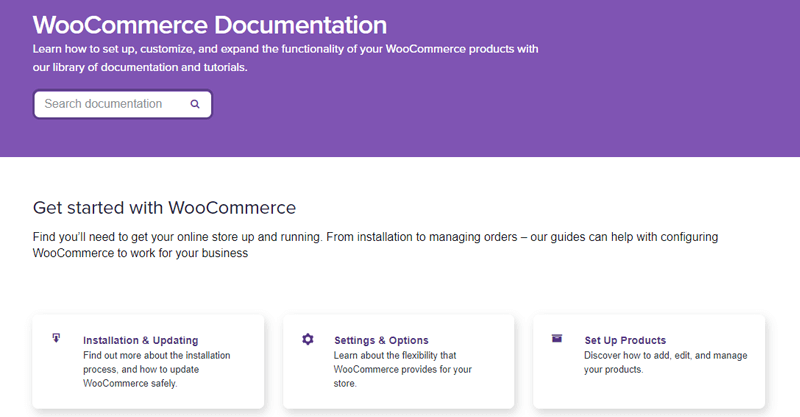
In addition, WooCommerce is supported by a worldwide community of experts, developers, and users who are constantly improving the software. As a result, you may also always turn to the community for help.
Meanwhile, support is available from the relevant teams of various other premium services such as hosting, plugins, themes, etc.
Bottom Line
In a nutshell, WooCommerce is ideal for individuals who wish to craft fully-fledged eCommerce websites. The extensive feature set of WooCommerce with WordPress makes it one of the top-notch competitors and alternatives to Shopify.
Moreover, if you already have a site on WordPress, then WooCommerce is definitely the way to go for building your online store. As this saves up a lot of time, effort, and money. At the same time, WooCommerce is highly feature-rich, and its extensive capabilities for eCommerce sites set it apart from the competition.
Though you’ve to manage your own server and domain name, you don’t have to pay any kind of transaction fees with WooCommerce. Meanwhile, you’ve to pay certain charges as transaction fees with Shopify. That’s to say, with WooCommerce all the bucks earned are absolutely yours!
Without a doubt, WooCommerce is one of the viable alternative and top-notch competitors to Shopify. And thereby, WooCommerce stands on the top of our list.
Want to know more about WooCommerce features and functions compared to Shopify? Read our article WooCommerce vs Shopify.
2. Wix
Another top competitor and alternative to Shopify is Wix. Wix is definitely one of the renowned website builders on the market. Nevertheless, it’s not limited to only creating blog sites. Rather you can build a powerful eCommerce site. As it offers you with exclusive eCommerce builder popularly known as ‘Wix eCommerce’.

Without a doubt, Wix eCommerce is a straightforward and easy-to-use eCommerce platform for beginners to start their online store. Similar to Shopify, it’s also a fully hosted platform. That’s to say, you won’t have to worry about hosting. Plus, you’ll also obtain a free subdomain with the pattern ‘yoursitename.wixsite.com’.
What Makes Wix as Shopify Competitors and Alternatives?
- It allows you to create a professional website using a drag-and-drop interface.
- Includes a number of themes for displaying your goods and services. Further, you can fine-tune it to your eCommerce site’s exact requirements.
- You can even ask Wix ADI to construct a website for you by addressing a few simple questions.
- Expand your eCommerce business by assisting you with email marketing, social media postings, Facebook ads, and client management.
- Wix has no transaction fees. Regardless, you’ll have to pay the regular fees as set forth by the various payment gateways.
- An SSL certificate is integrated with every Wix package. This helps to secure your site’s data along with in-browser interactions using HTTPS.
- It has a currency converter so that your consumers can browse your store in their own currency.
Drawbacks of Wix:
- Wix’s vast customization possibilities can make beginners a little overwhelmed.
- Once your eCommerce website is online, Wix’s templates are not changeable. This restricts changing your site structure.
Wix Pricing:
As Wix is a freemium website builder, it comes in both free and paid versions. However, the free version is restricted and doesn’t include eCommerce features.
Therefore, you’ve to buy Wix eCommerce that’s available to you at the following pricing schemes:
- Basic: You can purchase this package at $17/month. It provides you with a free 1-year domain, secure online payments, unlimited bandwidth, etc.
- Unlimited: This plan is available for $25 per month. It comes with all of the basic plan’s features, including 35 GB of storage space, a 10-hour video restriction, and 24/7 customer service.
- Business VIP: At $35/month, you can purchase this plan. You get all the benefits of an unlimited plan. Along with 50 GB of storage space, limitless video hours, priority customer service, and personalized reports.
Support Service of Wix
If you run into any troubles, then you don’t be concerned as Wix delivers good customer service.
In fact, its main website features a distinct Wix Help Center area for customer help. There are numerous resources available, including hundreds of tutorials and documentation articles.
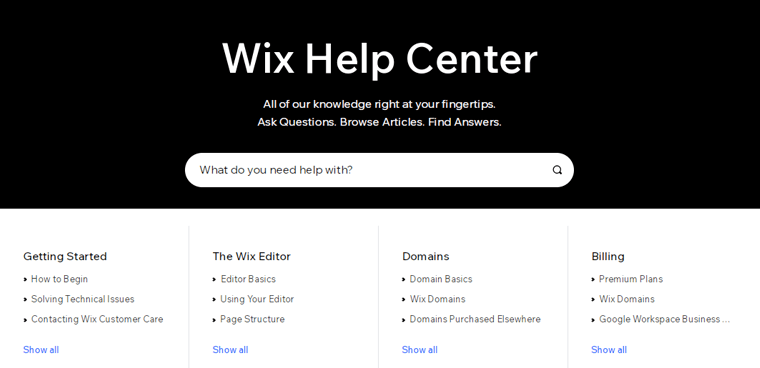
Additionally, it also offers live phone and email support to its paying customers. They offer a support team available to help you with any issues that you may encounter.
Furthermore, they have an engaging community that assists one another. Such active forums can easily provide answers to a number of your questions. This makes it easier for you to experience Wix and solve common difficulties and concerns.
Bottom Line
Despite the fact that Wix lacks a few capabilities offered by other eCommerce platforms, it’s definitely the best option for novices. In fact, as Wix is one of the most popular website-building platforms, there are a plethora of blogs available to assist you.
With its extensive customization possibilities, you can make your eCommerce site as versatile as you want with no restrictions. And the best part is that Wix doesn’t charge you any transaction fees for payments made through third-party channels. Meanwhile, Shopify charges you for that.
Wix is definitely a way to go if you’re just starting off with an eCommerce website. As it’s quite budget-friendly and worth the price paid. Thereby, Wix makes it one of the top Shopify competitors and a viable alternative to try out.
Do you want to compare these two platforms in considerable detail? Check out our comparison article Wix vs Shopify.
3. BigCommerce
Another robust eCommerce platform out there is BigCommerce. In fact, BigCommerce is also known as SaaS (Software as a service). That’s to say, it includes everything from hosting, design, marketing features, payment methods, SEO, and more.

The most important factor to bear in mind is that it’s a fully hosted platform similar to Shopify. This means you won’t have to worry about setting up hosting and all. Furthermore, it instantly updates your in-store sales using a native POS (Point of Sale) system.
It also provides you with security features such as SSL (Secure Sockets Layer). This helps to keep your website data safe. Consequently, you’ll have more secured logins, payments, and other transactions.
What Makes BigCommerce as Shopify Competitors and Alternatives?
- Powered by a robust visual drag-and-drop website builder. With that, you can now create your eCommerce store via drag and drop hassle-free.
- Features a vast collection of industry-specific themes. You can choose a theme based on the needs of your store using the provided categories.
- There’s also the BigCommerce Apps store. It includes over 800 third-party apps and integrations you can use in your store.
- Accepts transactions in over 100 different currencies. And allows you to make local payments using your preferred payment gateway.
- Provides SEO-friendly custom URLs for your store’s product page. Further, that results in improved search results.
- If your customers do not check out after adding products to their cart, then you may use the abandoned recovery feature to send them an email.
- Orders, Products, Customers, Storefront, Marketing, Analytics, Apps, etc. are just some of the eCommerce features available.
- It offers a 15-day free trial to test out BigCommerce’s features and services.
Drawbacks of BigCommerce:
- Beginners might find its interface quite overwhelming and intimidating. As it has a bit more technologically oriented.
- There are only a few number of mobile apps that are available to you for free. Meanwhile, to access the other major functionality, you’ve to upgrade it.
BigCommerce Pricing:
As a part of this premium platform, it provides you with the following pricing schemes:
- Standard: Costs $29.95/month that provides you with features like checkout, reporting, gift cards, etc.
- Plus: At $79.95/month you can purchase this plan. Here, you get all the Standard plan features along with stored credit cards, persistent carts, stored credit cards, and more.
- Pro: This plan is available to you at $299.95/month. In addition to all the Plus plan features, you get product filtering, Google customer reviews, product filtering, etc.
Support Service of BigCommerce
An online store or an eCommerce website deals with lots of financial transactions. Therefore, any complications that arise on your eCommerce site can be costly.
BigCommerce, thankfully, offers a wide choice of support tools. This helps you get issues sorted out fast and efficiently. It provides 24-hour customer service via phone, email, live chat, support networks, and other methods.

In fact, when you sign up for BigCommerce’s Enterprise package, you’ll get your own personal account manager and onboarding consultant. These are the BigCommerce professionals who will assist you with any challenges you may encounter while using the platform.
Additionally, there are tons of helpful guides and documentation available in its Help Center. They guide you on effectively utilizing the platform. Plus, you can check out various FAQs and the most recent news related to the platform on its official site.
Bottom Line
Without a doubt, BigCommerce is one of the efficient, user-friendly eCommerce platforms out there. That provides you with adequate guidance to help you get started with your online store. In essence, creating an eCommerce website with BigCommerce is really simple.
You can easily create one by selecting a plan that suits your budget and preferences. Essentially, it features vast customization possibilities along with all the required eCommerce functionality. As a result, you can effortlessly develop an online store or create an eCommerce site and sell things digitally.
Thereby, this makes BigCommerce one of the top-notch competitors and alternatives to Shopify.
You might want to read our article on BigCommerce vs WooCommerce and BigCommerce vs Shopify. This might help you get more insight into how it stacks up against the competition.
4. Magento
Created by Adobe, Magento is one of the rising competitors and alternatives to Shopify. It’s a high-end eCommerce platform that offers a variety of pre-made and tailored solutions for crafting your online store. So, whether you’re a tiny business or a large multinational, Magento got you covered!

Basically, it offers Magento Open Source and Magento Commerce as eCommerce solutions. Both of these versions have the same core capabilities. Nevertheless, Magento Commerce contains a few extra features. This is specifically suitable for scaling and enterprise-level stores with significant sales volume.
Additionally, it includes coupons, recurring fees, the potential to polish SEO, per-customer content tweaks, and more. Also, you can effectively manage and administer both the front-end and back-end activities of your online shop.
What Makes Magento as Shopify Competitors and Alternatives?
- It helps you bring your eCommerce vision to life with its out-of-box capabilities and unrivaled customization choices.
- Provides a fully integrated payments system. This helps you to manage transactions and order data securely from your dashboard.
- You can gain insight, improve productivity, and keep track of every part of your store with its built-in security and data.
- Delivers personalized promos, seamless omnichannel fulfillment choices, and other end-to-end purchasing experiences at scale.
- Easily synchronize inventory, orders, customer information, and shipping information across your eCommerce platform.
- With a marketplace of applications, integrations, and extensions, you can take your business to the next level.
- Extend store experience throughout channels and new markets with better products. And, thereby sell to businesses and customers with ease.
Drawbacks of Magento:
- You may need to know to code because it has a fairly technical part. Or hire a developer to get the most out of this platform.
- The budget may be a stumbling point as Magento Commerce is fairly costly.
- It might not be suitable for small and growing enterprises.
Magento Pricing:
Magneto pricing is quite tricky to predict and is based on criteria found on your eCommerce website. A rough guesstimate would be around $15,000 and more. Yet, using its open-source software is completely free.
Support Service of Magento
When it comes to Magento support service, you won’t find any dedicated assistance because it’s an open-source eCommerce platform. Such as live chat, email, or phone support.
However, in its Help Center, there are other plenty of resources such as knowledge bases, educational blogs, discussion forums, and so on. From these places, you can get instant help from other users.
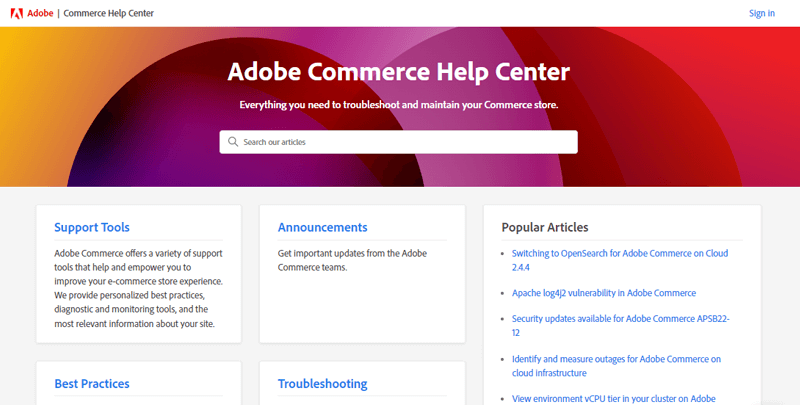
And if you’re a premium user of Magento, then you’ll definitely get 24/7 dedicated customer care support in any kind of emergency.
Bottom Line
Magento is an extremely flexible eCommerce platform, offering several features and customization options. There are also numerous demos, tutorials, and documentation to assist you in getting started.
Though it can be quite pricey for small enterprises. However, it’s worth noting that Magento is also accessible as open-source software. So, if you’re a developer, then you can use this platform for absolutely free to create an eCommerce site.
Nonetheless, Magento is an all-in-one eCommerce solution, with a wealth of capabilities and practically no big loopholes in the platform. Therefore, it has the potential to outperform Shopify. And thus, makes it one of the top competitors and alternatives to Shopify.
5. Nexcess StoreBuilder
Nexcess StoreBuilder is the perfect blend of Nexcess’s managed WooCommerce hosting and their eCommerce knowledge. No doubt, it’s one of the capable Shopify competitors and alternatives.

Essentially, it’s an AI-powered eCommerce builder. That simplifies the process of crafting an online store. It just asks you a series of questions and gathers information about the type of eCommerce site you desire. Further, it provides templates and design options that are tailored to your online store needs.
Also, you’ll be happy to know that it charges no transaction fees or urge you to buy expensive add-ons. Meanwhile, Shopify lacks these qualities. Therefore, it makes it one of the strong Shopify competitors and alternatives.
What Makes Nexcess StoreBuilder as Shopify Competitors and Alternatives?
- A fully managed eCommerce site builder that handles all technical details. So, even if you don’t have any coding experience, there are no worries.
- Integrated with multiple payment options. Such as WooCommerce Stripe Gateway, WooCommerce PayPal Payments, etc.
- Provides free SSL to help you create a highly-secured eCommerce site. Plus, it has a CDN for the smooth operation of your site.
- Includes a Sales Performance Monitor tool to check your store’s performance right from your inbox.
- Also, it has the Plugin Performance Monitor tool that examines the store’s changes before and after using a plugin.
- You can promote your online store or goods on social media to help you turn your followers into customers.
- Contains an abandoned cart recovery feature for more lead conversion. You can send emails to your customers informing their items are still in the cart.
Drawbacks of Nexcess StoreBuilder :
- It lacks in-built marketplace features that are easily available on other eCommerce platforms.
- You need to be extra cautious when answering StoreBuilder’s questions for better results.
Nexcess StoreBuilder Pricing:
Before settling into Nexcess StoreBuilder, you can try its risk-free 30 days trial. And then purchase this premium platform at the following pricing schemes:
- Monthly Plan: You can purchase this plan at $19/month for a single site. It comes with 30 GB of storage and 3 TB of bandwidth, as well as a 30-day free trial period.
- Annual Plan: It costs $190 per year for a single website and includes a two-month free trial. As well as all of the monthly plan’s features.
Support Service of Nexcess StoreBuilder
Without a doubt, you can totally rely on the support service of Nexcess store builder.
When you use this platform, you get live professional assistance from the StoreBuilder team. To be precise, you’ll have 24/7/365 access to world-class eCommerce service via phone, email, and chat.
It also contains an extensive Nexcess knowledge library with complete instructions on a variety of topics. This also includes a comprehensive tutorial on how to use StoreBuilder. Along with that, you can also check out various FAQs on its support page.
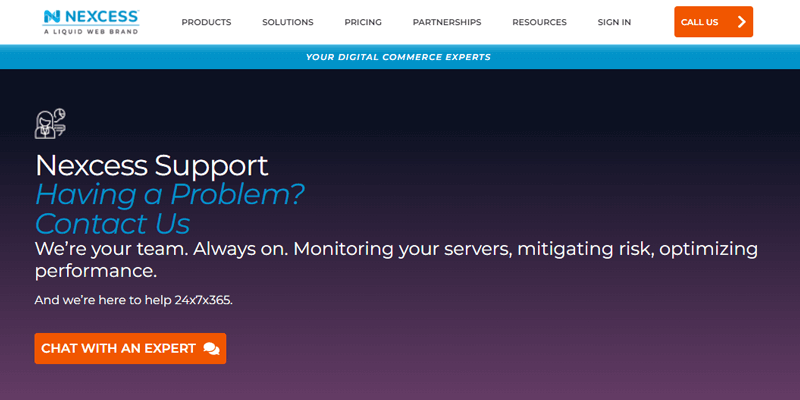
Besides, you can also check out different blogs, and webinars, and listen to podcasts, to learn more about the Nexcess StoreBuilder platform.
Bottom Line
In a nutshell, Nexcess StoreBuilder is an eCommerce site platform that’s completely hosted (on Nexcess). And thereby, allowing you to easily set up an eCommerce store using WooCommerce. As it offers you a plethora of free and premium styling features and functionalities.
And like earlier mentioned, the best thing about this platform is that serves with an AI assistant. Therefore, creating and tailoring your eCommerce site exactly to your needs has never been this easier. Hence, you can definitely try out Nexcess StoreBuilder as one of the top Shopify competitors and alternatives.
6. PrestaShop
PrestaShop is one of the top-notch competitors and preferred Shopify alternatives. Particularly for budget-conscious eCommerce entrepreneurs. Similar to other open-source software, you’ll have to manage the domain and hosting package on your own on PrestaShop.

And the best part about this platform is you don’t have to pay any additional transaction fees for your sales. Moreover, it supports up to 75 languages. To put it another way, you can reach out your eCommerce site to a global audience.
In addition, it also includes a large add-on market and a set of built-in eCommerce functionality. Thereby, this provides a quick remedy for merchants to build a full-fledged eCommerce store or website.
What Makes PrestaShop as Shopify Competitors and Alternatives?
- Comes with a user-friendly and well-organized dashboard. There you can discover any configuration and set up your store quickly and effortlessly.
- Offer mobile-friendly themes that can be further customized by changing colors, graphics, layouts, and fonts.
- Allow your customers to pay using Visa, MasterCard, Discover, American Express, or PayPal.
- Includes automated process to trace all sync history of your visitors’ interactions on your eCommerce site.
- Gives control over how your products display in Google searches. That, includes meta description, permalink, and so on.
- You can use call-to-action buttons, cross-selling, and promotional content to draw attention to your products.
- Send automated emails to your customers to keep them updated on the status of their orders.
- Evaluates the effects of promotional efforts and provide information on visitor navigation on the site.
Drawbacks of PrestaShop:
- Requires coding skills. Or alternatively, you’ll need to hire a developer to get the most out of this platform.
- You are responsible for your own domain name, hosting, SSL certificate, and other aspects of your eCommerce site.
PrestaShop Pricing:
As earlier mentioned, PrestaShop is open-source software. That’s to say, you can use it for free of cost.
Nevertheless, you can buy specialized themes and additional modules from the PrestaShop addons marketplace. The price of extensions starts from $35 and varies further as per the functionality. Consequently, this helps to tailor your store exactly to your needs.
Support Service of PrestaShop
When you use an open-source platform to create your eCommerce site, then it’s very likely you might run into confusion and issues.
Thereby, Prestashop offers a wealth of free support resources for users and development teams. That includes documentation guides, training courses, FAQs, and tutorials. You can easily get much help from these resources with most of your problems.
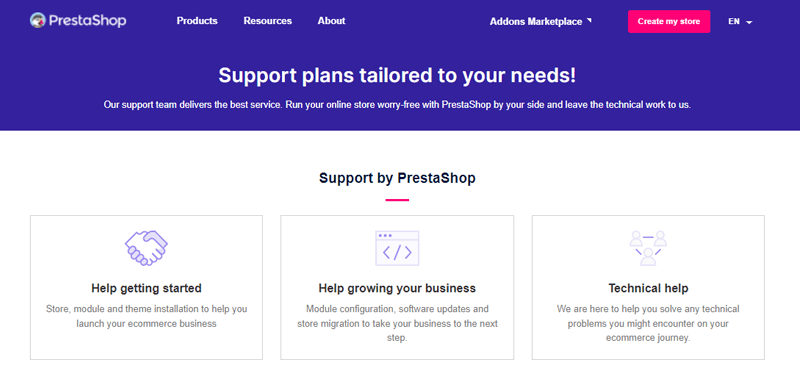
Moreover, you can also join the PrestaShop forum which has over 1.2 million people. You can always discuss any urgent issues related to the platform and seek advice from the community.
In addition, there are various premium support plans provided by PrestaShop. Such as tickets to directly reach out to the experts. If the above-mentioned ways didn’t work for you, then you can always go forward with its premium support plans.
Bottom Line
PrestaShop is a wonderful choice for merchants that want to take advantage of the open-source nature’s flexibility. While still appreciating the simplicity of use when it comes to shop management, SEO, inventory, and other features.
Therefore, if you’re a developer or willing to hire one, then PrestaShop is definitely the way to go for.
You can start with a little budget and progressively expand your website without having to worry about upkeep. This makes PrestaShop an excellent option for small and medium businesses. And henceforth, one of the top-notch Shopify competitors and alternatives to consider.
7. OpenCart
OpenCart is another open-source platform that lets you create an online store for free of cost. This makes it one of the capable Shopify competitors and alternatives.
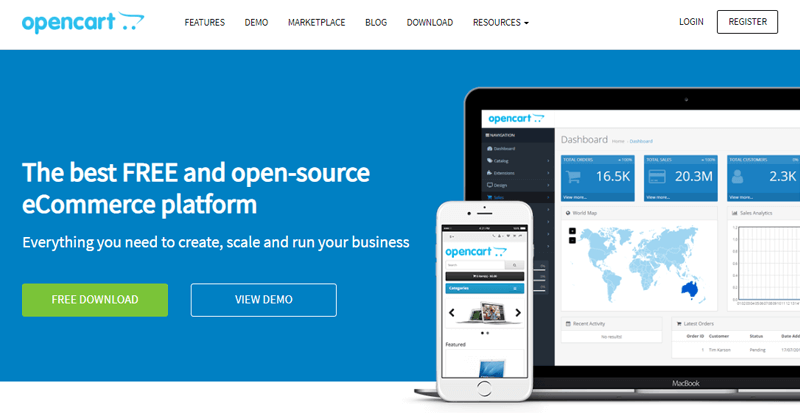
Important, it comes with an admin dashboard. There you can get a complete picture of your eCommerce site. Such as total orders, sales data, customers, etc.
Additionally, you can manage multiple stores with OpenCart from the same dashboard. Not to mention, it also facilitates you to set a different theme for each store. Along with that, it includes a mechanism for adding extra vital product characteristics. For example colors, length, and size of a variety of products.
Not to add, it’s definitely one of the high-quality platforms in the domain of open-source builders. This is proved by its extensive community of site owners.
What Makes OpenCart as Shopify Competitors and Alternatives?
- A simple platform even for non-technical-minded people to easily customize the feature set of your online store.
- There are numerous free and paid themes available. This provides your store with a smooth, appealing, and sales-worthy appearance.
- Choose from 36 payment options that come pre-installed with OpenCart. Or, you can browse the OpenCart marketplace for hundreds more.
- Facilitate you to sell anywhere in the globe and any currency. Plus, you can set up a taxation policy and automatically receive rate updates.
- Set advanced access controls and distinct privileges for different customer segments. This makes user administration easier.
- Provides discounts and coupons for grabbing the attention of site visitors and increasing sales.
- It does not require any continuous development costs to keep it running.
Drawbacks of OpenCart :
- Beginners might find it a little difficult to adapt to OpenCart.
- The software might be slow to load, especially on larger sites. Consequently, this can make for an unpleasant shopping experience over time.
- It isn’t geared for search engines as much as it could be. So, you’ll need to handle this issue individually for the best search engine results.
OpenCart Pricing:
Since OpenCart is a free eCommerce solution, you don’t have to pay any price to use this application. Meanwhile, you’ve to take care of hosting and domain on your own. That might usually start with around $5/month.
However, it does have its own OpenCart marketplace where you can find tons of free and paid extensions. So, the price depends upon the extension that you’re willing to purchase. Normally, the extensions start from $20.
Support Service of OpenCart
Similar to PrestaShop, OpenCart has community forums and offers paid technical support services to its users. As a result, this helps you to resolve any issues that you may have.
To be specific, OpenCart has its community forum. That comprises over 100000+ active users. You can always reach out to the community for any kind of help and assistance. Whether be it bug fixes, installation, configuration, and so much more.
Moreover, you can also find tons of resources such as blogs and documentation on the official OpenCart website. Here, you can find the solution to the majority of your problems.
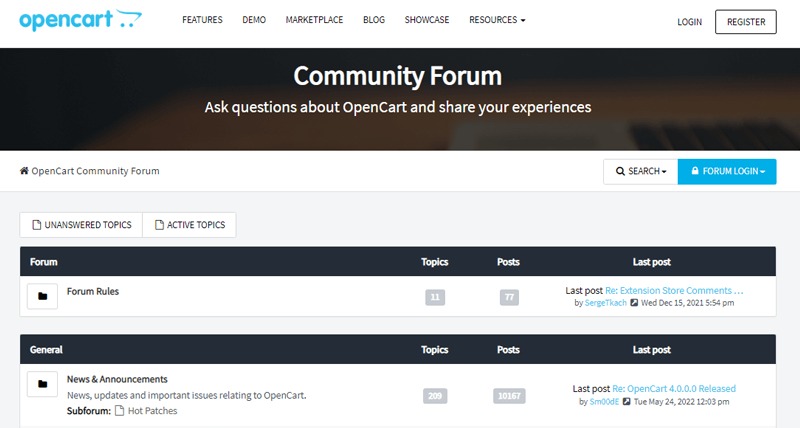
Nevertheless, if your issues don’t get solved, then you can always go for premium dedicated support. And submit a ticket to get your issues resolved by the experts.
Bottom Line
It goes without saying that OpenCart includes all the features you’ll need to get your online store up at a reasonable cost. Consequently, this makes it a more suitable eCommerce platform particularly for start-ups as compared to Shopify.
Another point to note is OpenCart’s remarkable flexibility and eCommerce functionality. This provides absolute control over your eCommerce site. Plus, its user-friendly interface makes it incredibly easy for you to learn and use the platform. As a result, you can easily get started selling your products straight away.
Considering all the positives and negatives of OpenCart, it definitely is one of the powerful Shopify competitors and alternatives. And if you’re tech-savvy and prefer a high degree of customizability, then OpenCart is certainly the way to go for.
8. Squarespace
Squarespace is one of the other top Shopify competitors and alternatives that you might want to try out. Founded in 2003, Squarespace has assisted millions of users in the creation of their own eCommerce websites.

Just like other eCommerce platforms on this list, it’s also a SaaS platform. That’s to say, you’ve to pay a certain amount of monthly fee to fully utilize the Squarespace. And with that, it opens you up to an all-in-one suite of tools. That gives just exactly what you need to create a website.
You can easily access anything from the finest template design to vibrant color palettes, fonts, styles, and so much more. Not to add, you can also effortlessly publicize your online store and scale your business.
What Makes Squarespace as Shopify Competitors and Alternatives?
- It’s a simple drag-and-drop website builder and a completely hosted platform. So, you don’t need to set up any web hosting and extra apps.
- Provides you with SSL certificates and PCI (Payment Card Industry) compliance for more secured financial transactions.
- You can also use Google AdSense to integrate paid adverts, sponsored content, and other features on your eCommerce site.
- Includes various extensions for inventory, merchandise, analytics, shipping, and so on.
- Allow clients to monitor your availability and schedule appointments directly from your website.
- Simple payment and checkout choices for your customers with diverse shipping methods and authentic shipping rates.
- Whether you sell online or in-person, retain your stock and customer details in sync.
Drawbacks of Squarespace:
- It has limited templates and designs as compared to other eCommerce platforms.
- Squarespace only includes promotional features on its top premium plan. And the price tiers are rather expensive.
Squarespace Pricing:
Well, talking about the price structure of Squarespace, then it’s quite transparent. As it provides a feature set that includes everything you’ll need at fixed rates. To be precise, it has 2 premium eCommerce-specific programs. They are:
- Basic Commerce Plan: Costs $27/month, billed annually. It includes features such as unrestricted product sales, no transaction fees, gift cards, customer accounts, etc.
- Advanced Commerce Plan: Costs $49/month, billed annually. It contains all of the capabilities of the Basic Commerce Plan, as well as several eCommerce-specific capabilities. For example, abandoned cart recovery, sell subscriptions, advanced shipping, commerce APIs, etc.
Support Service of Squarespace
As for support services, Squarespace has Help Center on its official website. Where you can simply type in any related topic in the search bar, and thereby find the related resources that might be of your help.
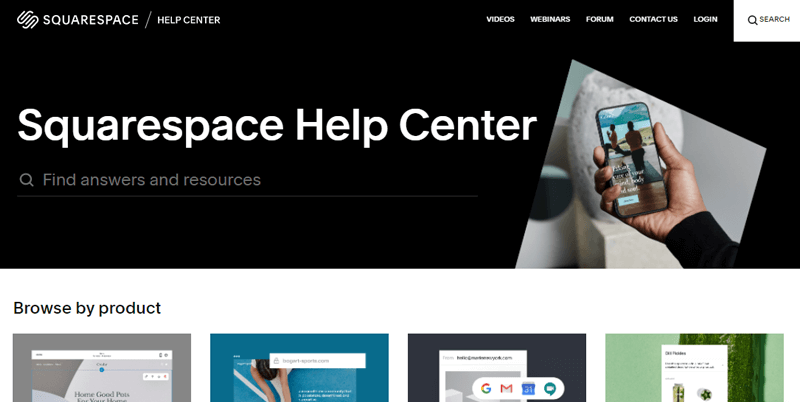
Moreover, you can also locate popular guidelines with which most people have problems. There are also videos on various getting started series, accounts, pricing, statistics, and so on.
Aside from that, there is a forum community that keeps you up to date on Squarespace and related issues. They have a lot of postings on each of the areas that can help you solve problems.
Not to mention, you can also go for live chat support during business hours for any kind of emergency.
Bottom Line
In a nutshell, Squarespace is a feature-rich drag-and-drop eCommerce website builder. It’s full of eCommerce capabilities. Such as configurable commercial pop-ups and banners, abandoned cart recovery, automated shipping rate computations, etc. And these features set it apart from Shopify.
Therefore, it’s ideal for people who desire professional-looking websites without putting in a lot of effort. So, whether you’re a restaurant seeking an online reservation, or an online magazine selling subscriptions, Squarespace got you covered.
As a result, it’s one of the most viable Shopify competitors and alternatives worth checking out.
You might want to read our detailed comparison article on WooCommerce vs Squarespace for more information.
9. Volusion
Last but not the least, we’ve got Volusion as one of the top-notch Shopify competitors and alternatives. Simply put, it’s the platform to look forward to if you want a feature-rich yet novice-friendly eCommerce solution.

To be more exact, it includes everything you’ll need to start your own store. It contains a number of features, including a drag-and-drop site builder and a custom page editor. Furthermore, you can find professionally designed themes, custom domains, simple functionality, and more.
Without a doubt, you can design your online store precisely how you’ve imagined it using Volusion’s extensive feature-set and functionality. As a result, you can perfectly brand your products with several visuals and descriptions that highlight what you have to offer.
What Makes Volusion as Shopify Competitors and Alternatives?
- Comes with an easy-to-use inventory system. That shows product data, monitors stock reorder quantity limits, verifies quantity, and more.
- Offers you various payment methods. Such as Amazon Pay, PayPal, electronic checks, wire transfer, money orders, etc.
- Provides an advanced search option to help your customers quickly the products in your online store.
- Its seamless checkout technology makes it simple for customers to navigate through the checkout process, reducing cart abandonment.
- You can sell your products worldwide by helping clients to see prices in their own currencies.
- With its built-in commercial features in specific spots, you can visually showcase your logo across your site.
- Set overall shipping prices, specify delivery kinds, offer affordable alternatives, and exclusive discounts.
Drawbacks of Volusion:
- There is no built-in blogging functionality. Plus, there is also a limit on the number of products you can sell in its basic personal package.
- You’ve to make an additional expense to buy an SSL certificate which is normally offered by other platforms.
Volusion Pricing:
Before purchasing any of its premium plans, you can try Volusion for free for 14 days as a trial with no credit cards necessary. Nevertheless, you can fully optimize this platform at the following pricing schemes:
- Personal: Cost $35/month billed annually. You can add up to 100 products, and pay 1.25% only transaction fees, secure checkout, etc.
- Professional: Costs $79/month billed annually. You can add up to 5000 products, pay 0.65% transaction fees, get online+ phones to support, 5 staff accounts, and more.
- Business: Costs $299/month billed annually. You can add unlimited products, get premium support, pay only 0.35% as transaction fees, and other features.
Support Service of Volusion
Customer assistance is one of the major advantages of using Volusion to open an online store.
In fact, Volusion claims to offer free 24/7 support to help you with every aspect of your expanding business. For any of your concerns, you can quickly schedule a call with Volusion’s support team.
It also has its own Help Center, where you can simply type in the search bar to look for relatable answers. Moreover, it also contains tons of skillfully written articles and documentation for your assistance. You can simply browse through them and find the answers to your problem.

Besides, it also provides a chat support service. So that you can personally chat with experts for one-on-one assistance.
Bottom Line
In a nutshell, Volusion has the most comprehensive inventory of any eCommerce website-building platform. Despite its few flaws, its features such as product videos, tons of payment gateways, suggested item features, etc are its unique strengths.
Moreover, it has a more user-friendly backend than any other platform. This is especially appealing to DIY shopping websites and those who may not want to spend a lot of time creating their website. As a result, it’s one of the viable Shopify competitors.
Therefore, it’s definitely a good option if you want a well-organized store with some beautiful built-in eCommerce features.
Conclusion
And, that’s all there is to it folks! We did our best to list the finest Shopify competitors and alternatives. So, we hope it was fruitful for you. Nevertheless, it’s entirely up to you to choose the right platform for your eCommerce website.
Yet, if you ask for our recommendation, then we suggest WooCommerce. It’s the free open-source eCommerce platform with vast possibilities for your online store.
Also, do share your experience if you’ve used any of these platforms before in the comment section below. If you’ve any queries related to any of the above platforms, then please feel free to ask us. We’ll be pleased to assist you.
We also recommend you read our latest article on the best eCommerce WordPress themes. You might also want to read the best multivendor eCommerce platforms.
Lastly, do spread the word with your friends and family if you liked this Shopify competitors and alternatives article.
Don’t forget to follow us on Facebook and Twitter to stay up-to-date with future updates.

